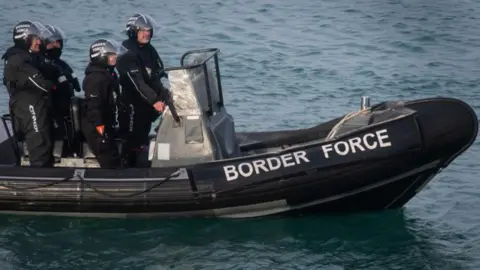In a significant development regarding immigration policy, the first group of migrants has been detained in the United Kingdom under the new “one in, one out” agreement with France. This deal aims to address the ongoing challenges associated with the increasing number of individuals attempting to cross the English Channel in small boats. The detentions occurred on Wednesday, marking the initial day of the pilot program’s implementation, aimed at managing and curbing irregular migration while ensuring a systematic approach to asylum seekers.
The recent images captured during this operation depict migrants equipped with life jackets as they disembarked from Border Force vessels upon reaching Dover. The Home Office has confirmed that these individuals will be held in immigration removal centers until arrangements for their return to France can be made. Such measures reflect the UK government’s commitment to enforcing stricter immigration controls while upholding international obligations concerning asylum.
Home Secretary Yvette Cooper expressed her views on the initiative, describing the recent detentions as a pivotal action under the “ground-breaking new treaty.” This treaty is designed to convey a clear message to potential migrants: those pursuing dangerous journeys across the Channel should reconsider their decisions, as doing so may lead to significant risks and the loss of their financial resources. The overarching goal is to deter individuals from relying on organized crime syndicates that facilitate these perilous crossings.
The pilot scheme is slated to last for a duration of 11 months and outlines a system where the UK will accept an equal number of asylum seekers from France who have not attempted the channel crossing. These individuals must pass requisite security and eligibility verifications to qualify. Under this arrangement, UK officials plan to facilitate rapid referrals for the return of migrants to France within three days of their arrival. French authorities are expected to respond to these referrals within a two-week time frame, establishing a structured process for handling irregular migration.
Interestingly, this agreement introduces provisions that allow adults and families currently residing in France the opportunity to apply for transfers to the UK through an online platform established by the Home Office. Applicants must adhere to certain suitability criteria, navigate a standard visa application process, and pass ongoing security checks. If selected, these individuals will be granted a three-month window to claim asylum or seek a visa during which they will also be subjected to the same restrictions placed on other asylum seekers, including the inability to work, study, or access public benefits.
In anticipation of potential challenges and misunderstandings of this initiative, the Home Office has plans to launch a public campaign aimed at informing migrants in northern France and other key areas about the details of the new treaty. The urgency of this situation is underscored by statistics indicating that as of the end of July, over 25,000 individuals had attempted to cross the Channel in small boats during 2025. This figure reflects a considerable increase of approximately 49% compared to the same timeframe in 2024.
It is crucial to note that current UK and international law safeguards the rights of asylum seekers, prohibiting their return to their countries of origin until their claims have been comprehensively assessed and adjudicated. However, the law permits the transfer of these migrants to safe countries that are willing to consider their asylum applications, further complicating the dynamics of irregular migration and international cooperation regarding refugee matters.
As this pilot program progresses, both UK officials and migration experts will be closely monitoring its implications for border control and asylum processes, particularly the effectiveness of this innovative treaty with France aimed at balancing the responsibilities associated with migration while addressing the humanitarian needs of those seeking refuge.











